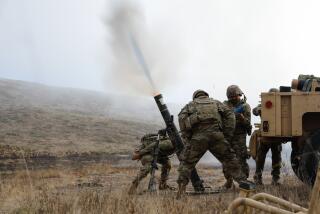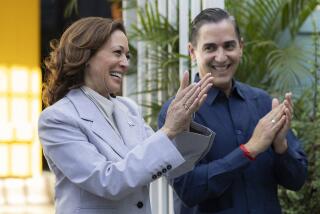Battle Over Bombing Range in Puerto Rico Spreads to Campaign
- Share via
WASHINGTON — Bombed, shelled and invaded in military training exercises for 58 years, a tiny, palm-fringed Puerto Rican island is now the site of a fierce battle entangling the White House, the Pentagon, and the campaigns of Vice President Al Gore and First Lady Hillary Rodham Clinton.
With a controversy over the release of 11 Puerto Rican militants still simmering, the Clinton administration is struggling to decide whether to bow to growing pressure to permanently close the Navy’s live-fire training range on the Puerto Rican island of Vieques.
Puerto Rican advocates, enraged after two stray 500-pound bombs killed one Vieques resident and injured four others last April, accuse the Navy of battering and polluting the island for six decades while hampering the efforts of its 9,300 residents to lift themselves out of poverty.
“The Navy’s attitude is, ‘We own Vieques, and we do whatever we want,’ ” said Carlos Romero-Barcelo, Puerto Rico’s delegate in the U.S. House of Representatives and a former governor of the commonwealth. “Would they do this to Martha’s Vineyard?”
Navy officials strongly defended their use of the island and said that it is crucial to maintaining military readiness. They insisted there is no other site that would adequately substitute for the Atlantic Fleet’s only full-service range, where they can practice amphibious invasions with as many as 10,000 sailors and Marines under conditions approximating those of battle.
The loss of Vieques, they said, would compel them to send warships partly unprepared to trouble spots. The range, which once operated 180 days a year, has been temporarily closed since the April fatality.
Both sides have mounted aggressive public advocacy campaigns, presenting the administration with what appears to be a stark choice between satisfying an important Latino constituency or a military establishment that President Clinton has always been reluctant to disappoint.
Top Navy and Marine officials and regional commanders such as Army Gen. Wesley K. Clark, the North Atlantic Treaty Organization’s supreme commander in Europe, have urged the administration to keep Vieques in military hands.
Puerto Ricans who oppose the American presence, meanwhile, are seeking the support of Democratic presidential front-runner Gore and Mrs. Clinton, a presumed Senate candidate in New York, and have won sympathetic statements from both. The advocates said that the issue could resonate with all Latino voters in the 2000 elections.
The Vieques controversy already has prompted angry protests in New York and Puerto Rico. Since April, four groups of protesters have camped out on Navy property on the island to thwart any attempt to reopen it.
Many Puerto Ricans attribute the problem to colonialist attitudes that they trace to the U.S. seizure of Puerto Rico in the Spanish-American War. It was the Navy, after all, that first applied American might in Puerto Rico, steaming into San Juan harbor on May 12, 1898, and bombarding the city for four hours.
The Navy began buying Vieques property in 1941 as it geared up for World War II. The Navy occupies about two-thirds of the 21-mile-long island, which is about eight miles east of Puerto Rico.
The military property is at the east and west ends of the island, while the residents, including farmers and fishermen, live in the middle.
The live-fire range enables gunners on warships to practice lobbing shells from their 5-inch guns, while fliers drop precision bombs and Marines practice amphibious landings on the island’s beaches.
The site is particularly valuable to the Navy because the forces do not have to compete with civilian planes or ships. A military study group recently examined 18 alternative sites in the Atlantic, but none came close to offering the advantages of Vieques.
In an interview, Navy Secretary Richard Danzig said he recognizes that Puerto Ricans have a legitimate concern over “a sense that they have been disenfranchised” on the island. Yet national security is also a legitimate concern, Danzig said, and nobody “has suggested another place that does it nearly as well.”
The Navy has said that it is willing to cut back its use of live ordnance and do more to develop the island’s economy. Yet Puerto Rican leaders, including Gov. Pedro Rossello, are in no mood to compromise.
They said that the Navy broke the rules last spring when military fliers fired low-radioactivity depleted-uranium shells and, earlier, when they dropped napalm. Some advocates charge that pollution from the range may be responsible for a cancer rate among residents that is 25% greater than in other Puerto Rican communities. The Navy said, however, that there is no evidence to support the charge.
Advocates contend that the Navy has been a poor steward of an island environment that includes rare species and valuable coral reefs, another accusation that the Navy disputes.
Puerto Rican leaders said that the Vieques issue gives the vice president and Mrs. Clinton chances to burnish their images with islanders, some of whom were upset over the Clintons’ recent handling of the issue of clemency for 11 jailed Puerto Rican militants.
President Clinton last week ordered freedom for the 11 former members of a pro-independence group, but only after Mrs. Clinton enraged some on the island by declaring that she opposed the move.
Howard Wolfson, a spokesman for the first lady, said that Mrs. Clinton is “clearly very concerned about the impact of the bombing on the people who live there and their environment.” A spokesman for the vice president said that, after a meeting with Gov. Rossello, who is a Gore fund-raiser, the vice president urged President Clinton to “find a solution” to the Vieques problem.
A senior administration official, who asked not to be named, said that a Pentagon study panel now examining the issue is considering several compromise proposals. One would have the Navy withdraw after a grace period of several years. Another would have Puerto Rico buy back the Navy property.
But this aide acknowledged that the administration has been frustrated both by the military’s public advocacy campaign and by the apparent eagerness of some Puerto Rican factions to keep the confrontation going “for their own political objectives.”
A Pentagon study panel, convened last spring, is weeks overdue in offering its recommendations to Defense Secretary William S. Cohen. Meanwhile, political pressures continue to rise.
Sen. Frank H. Murkowski (R-Alaska) last week introduced a bill to require the Navy to turn over its property to Puerto Rican control, even as the House prepared to open hearings on the subject.
With tempers rising--and encamped protesters making off with live ammunition from the range--Navy officials said that they worry about the safety of people on the island and at the big Roosevelt Roads Naval Station in Puerto Rico.
More to Read
Sign up for Essential California
The most important California stories and recommendations in your inbox every morning.
You may occasionally receive promotional content from the Los Angeles Times.











